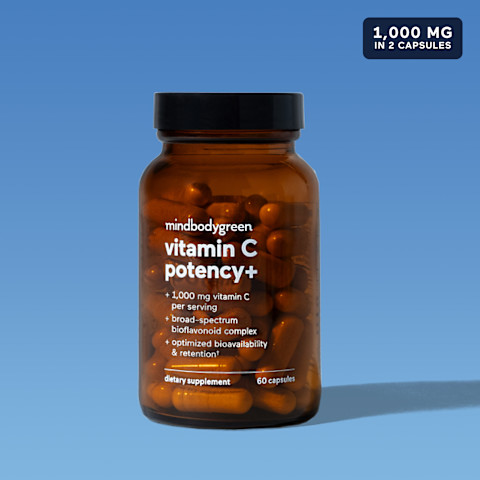Feeling Low-Energy & Blah? You Might Be Lacking This Essential Nutrient

Low energy looks and feels different for everyone. For one person, feeling drained is more of a physical experience; for others, occasional brain fog represents a whole other struggle. There's a very, very long list of possible reasons you might be feeling blah, from overworking to lack of sleep to nutrient gaps.
Specifically, there's one commonly overlooked essential nutrient that, when consumed in adequate amounts, can support your energy levels. If you're feeling tired all the time, keep reading. This might just be what you're lacking.
How vitamin C supports energy levels.
While vitamin C may be popular because of its power to support the immune system, it actually plays a role in both the brain and the body's energy levels. On a physical front, vitamin C aids in iron absorption and helps the body synthesize carnitine, both of which are major players in your energy levels1.
Iron has low bioavailability, especially non-heme iron (i.e., iron that comes from plant sources rather than animals). So if your diet consists of mainly veggies, prioritizing vitamin C intake is a great way to enhance the bioavailability of non-heme iron2. Think of iron as the main character influencing your energy levels and vitamin C as the underrated sidekick helping iron do its job in the body.
Now let's chat about mental energy, more specifically motivation. Even if you're buzzed off espresso shots, having the motivation to start a task and stay focused isn't always easy—this can be another form of low energy. PSA: Vitamin C supplementation can actually support brain health too, and research shows inadequate levels of this nutrient may be linked with this lack of motivation and mental vitality.*
In this double-blind, placebo-controlled trial3, researchers concluded that "Compared to the placebo, vitamin C supplementation significantly increased attention and work absorption with the distinct tendency of improvement on [energy] and comprehensive work engagement."* The young adults received a daily vitamin C dose of 1,000 mg over four weeks to net these impressive gains.
Where to get vitamin C.
There's a long list of rich sources of vitamin C—take grapefruit, kiwis, and broccoli, for example. However, if you want one surefire way you're getting enough of this nutrient daily (and to reap a load of full-body benefits), you may consider opting for mbg's vitamin C potency+.
This supplement contains a blend of high-potency vitamin C and citrus bioflavonoids. Altogether, this complex supplement delivers a strong dose of antioxidants—and ultimately serving up the equivalent vitamin C strength of 15 whole oranges, in fact.‡ This way, you can ensure your vitamin C is prepped and ready to support your iron intake and mental vitality.*
The takeaway.
Whether you're lacking physical or mental energy, everyone experiences that "drained" feeling differently. There are plenty of reasons you could be feeling blah, but a lack of adequate vitamin C may just be one of them. Vitamin C supplementation supports the full body—brain and energy levels included.* If you want to learn more about the all-around benefits of vitamin C, check out this story.
3 Sources
- https://journals.sagepub.com/doi/pdf/10.1177/147323000703500301
- https://www.cambridge.org/core/journals/proceedings-of-the-nutrition-society/article/regulation-of-dietary-iron-bioavailability-by-vitamin-c-a-systematic-review-and-metaanalysis/013552A920BF94D2BEFA94133AA6AB29
- https://www.ncbi.nlm.nih.gov/pmc/articles/PMC8783887/

